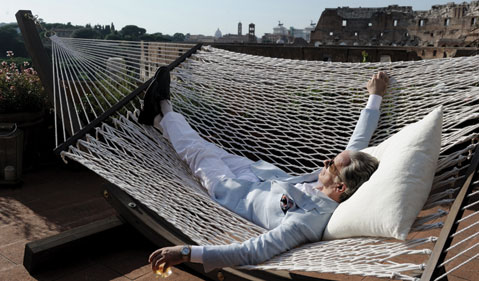Review: The Great Beauty
Toni Servillo, Sabrina Ferilli, and Carlo Verdone star in a film written by Paolo Sorrentino and Umberto Contarello and directed by Sorrentino.

For the past several weeks, I have uttered the phrase “The Great Beauty” countless times, usually in answer to the still-pressing question, “So what was your favorite film at the film festival this year?” Italian director Paolo (Il Divo) Sorrentino, who was in town with his stunningly fine film during the Santa Barbara International Film Festival, recently went on to nab the best Foreign Film Oscar, a category often opting for feel-good and/or sentimental fare.
So, what is it about this thing that so beguiles? Its central tale of a cynical journalist in Rome, who upon turning 65 struggles with soul-searching questions about the shallow hedonistic veneer of his existence, doesn’t smack of gripping cinema, at least on paper. And yet, from the first captivating yet cool scenes at a wild rooftop party and a convent, we are hooked and have more than a hint of a clue that this film is an unabashed homage to the twin peaks of Fellini’s filmography, La Dolce Vita and his masterpiece, 8 1/2, both with Marcello Mastroianni as its handsome and internally troubled protagonist and Rome herself as a prominent backdrop and character. Also like Fellini’s films, The Great Beauty deftly mixes up its underlying themes of existential and spiritual malaise with ravishing sensory bedazzlement, particularly via the virtuoso visualizations of cinematographer Luca Bigazzi, another towering “star” of SBIFF.
“Look at these people,” smirks our hero (magnetically played by Toni Servillo), “this wildlife. It’s my life, and it’s nothing.” A wise, mostly mute 104-year-old nun, who shows up late in the film and occupies a space between religious skepticism and sagacious wisdom, mutters something akin to a motto for living: “Roots are important.”
Contradictions and smug resolution-avoiding ideas abound here. Classical ruins nuzzle against contemporary architecture and attitudes, while religious airs and icons, tabloid gawking, intellectual imperialism, cheap sex, bizarre artistic detours, and flowing imbibing circulate freely in a story both broad and intimate in its reach. It is a true feast for the senses but also a puzzle for the mind and a bittersweet pill for the soul.
There is, in fact, a great beauty, along with a Dionysian abandon and literary gleam, to this film, one of those rarities that — for the believers among us — help to restore faith in the wow power of great cinema.



